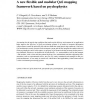Free Online Productivity Tools
i2Speak
i2Symbol
i2OCR
iTex2Img
iWeb2Print
iWeb2Shot
i2Type
iPdf2Split
iPdf2Merge
i2Bopomofo
i2Arabic
i2Style
i2Image
i2PDF
iLatex2Rtf
Sci2ools
117
click to vote
MMNS
1997
1997
A new flexible and modular QoS mapping framework based on psychophysics
Accounting for the perceiving conditions that make up the delivery environment of an application helps improve the efficiency of QoS provisioning systems. It is useless to transmit information whose absence cannot be noticed by the end-user under the actual perceiving conditions. Until now, QoS architectures mostly focused on the transport system and did not integrate the studies achieved in the psychophysics area. In this paper, we propose a QoS framework that accounts for the perceiving conditions. Moreover, our framework is both flexible - i.e., customizable at will by the manager - and modular, with a clear and fine-grained layering. New mechanisms and their supporting characteristics, such as experimental curves, may be very easily introduced and managed in the proposed architecture. A case study is carried out, which shows the applicability of the framework for a video-on-demand provisioning system. Keywords Quality of Service (QoS) framework, perceptual QoS, psychophysics, QoS ...
Actual Perceiving Conditions | MMNS 1997 | MMNS 2007 | Perceiving Conditions | QoS Provisioning Systems |
| Added | 01 Nov 2010 |
| Updated | 01 Nov 2010 |
| Type | Conference |
| Year | 1997 |
| Where | MMNS |
| Authors | Constant Gbaguidi, Olivier Verscheure, Jean-Pierre Hubaux |
Comments (0)

